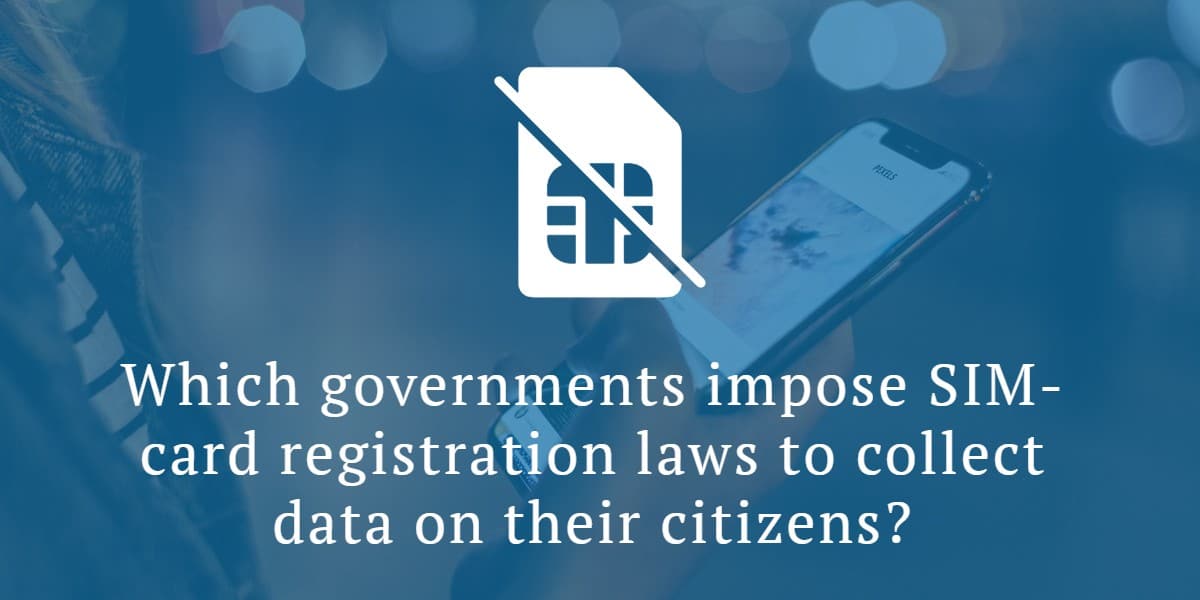Top 15 countries with the worst SIM-card registration policies

 www.comparitech.com
www.comparitech.com
- Tanzania (19 points) – Tanzania is at the top of our list with a score of 19/21. It manages to scrape back two points due to citizens being allowed a maximum of eight sim cards (one per provider) and law enforcement not having invasive interception tools (although they can access data without a warrant). Subscribers’ information is submitted to the relevant authority once a month and registration includes fingerprints. This data isn’t protected with storage limitations and with no data protection law in place, this leaves subscribers’ data open to various vulnerabilities. Furthermore, those who don’t comply with the law may find themselves being fined 7 million Tanzanian shillings (US$3,000) and/or spending more than two years in prison.
- Saudi Arabia (17 points) –Fingerprints are a requirement for anyone registering for a SIM card in Saudi Arabia and all of this data collected has to be validated by the provider before the SIM card is activated. Law enforcement has access to this data and may not need a warrant. No data storage limitations are mentioned and no data protection law is in place. Furthermore, residents are limited to 10 SIM cards.
- North Korea, Uganda (15 points) –Both North Korea and Uganda receive 15 points but for slightly differing reasons.
- North Korea scores poorly due to mobiles and their networks being supplied by the government, thus restricting people’s access to multiple SIMs and their privacy when using their mobiles. For example, if a user accesses something that they shouldn’t, they are sent an alert warning them that the government has noted this action. Users who don’t follow the registration process can receive prison sentences for as long as three years and could also face hefty fines. North Korea fails to protect registration data with no telecommunication storage retention or data protection laws. The government has ensured tourists aren’t able to leave SIM cards with residents by deactivating the SIM card after their visit and charging tourists $250 per SIM card.
- In contrast, Uganda doesn’t restrict the number of SIM cards used and enforces the requirement of a warrant to access customer data. However, Uganda’s poor score is due to its biometric checks for SIM-card registration, its capture and validate system, its lengthy storage retention laws (5 years after a contract is terminated or canceled), and its use of fines and/or imprisonment for those who fail to comply.
- Lebanon, Pakistan, Singapore, Sri Lanka (14 points) –
- Lebanon’s poor score comes from its limit of three SIM cards per person and its lack of protection for data collected. Lebanon is discussing the possibility of biometric checks.
- Pakistan’s score results from the use of fingerprints in the SIM-registration process, its capture and validate system, and its limit of five SIM cards per person.
- Singapore scores poorly due to the use of facial recognition, the limit of three SIM cards per person, and severe penalties for more extreme cases (excessive use of unregistered SIM cards).
- Finally, while Sri Lanka doesn’t use biometrics, it does fall short when it comes to SIM card limits (five per person), potential access to data without a warrant, and lack of data protection.
- Bahrain, Bangladesh, China, Myanmar, Nigeria, Tajikistan, United Arab Emirates (13 points) –Bahrain, Bangladesh, and China have very similar scores across the categories. All of them employ a capture and validate system, use fingerprints or facial scans in the registration process, allow law enforcement access without a warrant, and store data for lengthy periods of time.
- Myanmar is the only one of this group not to use fingerprints in the data collection process but scores poorly due to its SIM card limit (two per person) and lack of data protection.
- Both Nigeria and the United Arab Emirates have implemented severe penalties for those who don’t register their SIMs (imprisonment and/or fines).
- Tajikistan limits users to four SIM cards.
- Nigeria, the UAE, and Tajikistan score poorly due to their data retention periods either being lengthy or unclear.

Which governments impose SIM-card registration laws to collect data on their citizens? - Comparitech
Just over 5.4 billion people worldwide have mobile phones, accounting for almost 70 percent of the entire global population, according to the GSM Association. The majority of national governments (around 160) require mandatory SIM-card registration, which means you need your real name and...